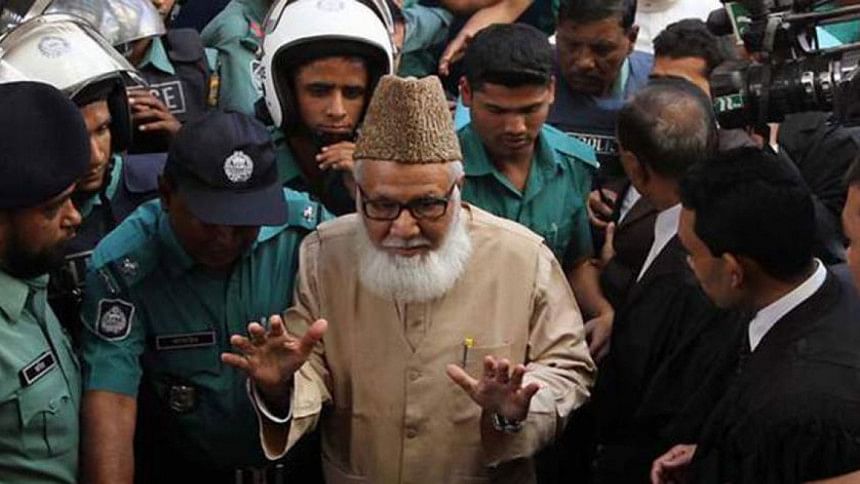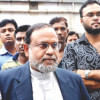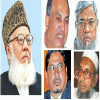Pak amnesia intentional

Pakistan has come up with an outrageous claim that what Jamaat-e-Islami chief Motiur Rahman Nizami did in 1971 was to uphold the constitution of Pakistan.
Its foreign ministry in a statement issued on Wednesday following the execution of Nizami claimed: "His only sin was upholding the constitution and laws of Pakistan."
The same day, during the passage of a resolution in the Pakistan national parliament condemning his execution, some of its MPs went a step further. They claimed that Nizami and other executed Jamaat leaders did not violate the law and constitution of the united Pakistan in 1971.
The foreign ministry's claim is factually incorrect because Pakistan did not have any constitution during the Liberation War of Bangladesh in 1971.
The constitution promulgated by the government led by General Ayub Khan in 1962 was abrogated on March 25, 1969 by General Yahya Khan.
Ousting Ayub from power, Yahya grabbed state power. He declared martial law, making all other existing laws subservient to the martial law proclamations and orders.
Pakistan did not have any constitution until the government of Zulfikar Ali Bhutto, who grabbed power by ousting Yahya, promulgated a new one in 1973.
So how did Nizami uphold the Pakistan constitution which did not exist at all in 1971?
The Pakistani MPs, those who claimed that Nizami and other who were executed for committing war crimes did not violate the constitution of Pakistan by their activities, however, are correct in the sense that there was no constitution at that time.
But their claim that Nizami and others did not violate any law of Pakistan is false. It is because the Pakistan Penal Code of 1860 that existed then did not allow them to kill and torture people and rape women.
Pakistan's foreign ministry and some of its MPs did not consider the fact to make the false claim.
They, however, proved by their actions, that they are grateful to Nizami for what he did in 1971 in support of Pakistani occupational army that carried out the heinous genocide on unarmed Bangalis.
Yes, Nizami upheld a law of Pakistan which was---Razakar Ordinance of 1971. General Yahya's government promulgated the ordinance to raise Razakars as a paramilitary force that would assist the Pakistan army to annihilate freedom loving Bangalis.
Nizami was the chief of Al-Badr, the brutal killing squad mostly comprised of leaders and activists of Islami Chhatra Sangha, the student wing of Jamaat-e-Islami in 1971. Jamaat's secretary general Ali Ahsan Mohammad Mojaheed, who was the second in command of Al-Badr and was executed in November last year for committing crimes against humanity.
Being chief of Al-Badr, Nizami worked to uphold the spirit of the Razakar Ordinance. In that case, Pakistan can now make the claim that what Nizami did in 1971 was to uphold the law of Pakistan.
The Al-Badr, as part of General Tikka Khan's scorched earth policy, made a list of intellectuals and picked them up around mid-December when they felt Pakistan was losing.
They shot and bayoneted the best minds of the country--writers, teachers, editors, physicians and intellectuals on December 14, 1971 at Rayer Bazar and Mirpur.
Nizami was sentenced to death for masterminding the killings of intellectuals, murders of 450 civilians and rape in Bausgari and Demra, Killings of 52 people in Dhulauri, killings of 10 people and the rape of three women in Karamja in Pabna.
He was also sentenced to life imprisonment on charges of involvement in the killing of Kasim Uddin and two others, and Sohrab Ali in Pabna, and torture and killing at the Mohammadpur Physical Training Centre in Dhaka, the Al-Badr torture centre where many intellectuals were taken before being killed.
His second in command, Mojaheed was hanged for leading the killing of intellectuals and other atrocities.
The killings and atrocities carried out by Nizami, Mojaheed and their cohorts were no way to uphold the so called Pakistan constitution. But their works had pleased the Pakistani generals in 1971 and those who still speak for them.
General Amir Abdullah Khan Niazi, who was chief of the Pakistani force in the then East Pakistan and led the genocide until the surrender in December 1971, lauded the Razakars for their performance.
Niazi dedicated his book "The Betrayal of East Pakistan,” among others to these Razakars, who he thought, had fought valiantly for Pakistan.
The way the present Pakistan leadership are reacting to the war crimes trial in Bangladesh proves they still remain grateful to Nizami and other Razakars.
The Pakistan foreign ministry in its statement offered condolence to the bereaved family members and the followers of Nizami. It also termed the trial proceeding flawed.
The national parliament did something more. It offered fateha for Nizami.
All these actions by the Pakistan ruling class prove Nizami along with other Razakars did a great job for Pakistani army that carried out the massacre to thwart the birth of Bangladesh as an independent country.
Pakistan did not come out suddenly with its outrageous reactions on Wednesday. It also reacted in the same manner to the execution of Mojaheed and BNP leader Salahuddin Quader Chowdhury in November last year.
In a statement issued by its foreign ministry in last November, it denied committing any war crime or atrocities during the 1971 War of Independence. It also rejected what it called “baseless and unfounded assertions” of Bangladesh against Pakistan.
Pakistan is deliberately forgetting that its atrocities are all in black and white. There are thousands of Bangladeshis who have testified of the harrowing tales of genocide. There are hundreds of thousands of Bangladeshis still living who carry the dark memories of the darkest hours in their lives.
The realities of its atrocities come out even in those Pakistani's own versions of the war. These are found in Pakistan's top military leaders' memoirs of the war as well as in the depositions of military officials to the Hamoodur Rahman Commission headed by the chief justice Hamoodur Rahman. The Pakistan government on 26 December, 1971 formed the commission to find out the reasons of defeat of the Pakistan army.
Pakistan remains consistent with its policy against the trial of war criminals. From the very beginning, it has sided with them.
After the end of the war, the Pakistan government made desperate efforts to block the trial of 195 Pakistani military officials for war crimes. To achieve this goal, then Pakistani government of Zulfikar Ali Bhutto even threatened to block repatriation of 4 lakh Bangalis stranded in West Pakistan. He even requested China to use its veto power to deprive newly born Bangladesh of UN membership. His government also went to the International Court of Justice in The Hague with the request that India not have over 195 POWs to Bangladesh.
Some of its MPs on Wednesday urged the Pakistan government to raise the issue of trial of war criminals in the UN and to put pressure on Bangladesh. Their threat is a manifestation of Pakistan's old strategy.
All these however suggest Pakistan's present leadership are still following the legacy of Zulfikar Ali Bhutto and the then military juntas who were desperate to block the trial of war criminals and in so doing they are deliberately distorting history. It seems they are suffering from amnesia of sorts from some perverted sense of political expediency.

 For all latest news, follow The Daily Star's Google News channel.
For all latest news, follow The Daily Star's Google News channel. 








Comments